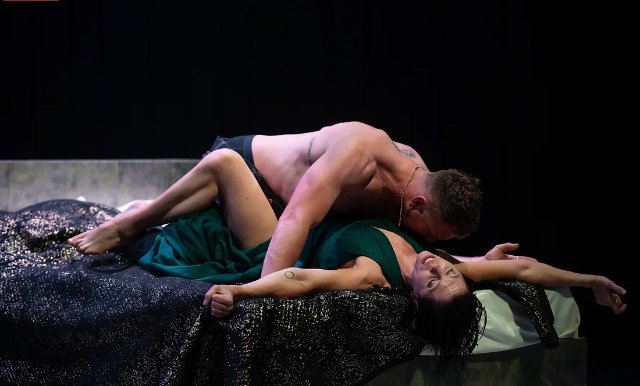Marina Carr at the Abbey Theatre
Dublin Looks at Girl on the Altar
By: Susan Hall - Jul 23, 2023
Marina Carr has joined Lady Augusta Gregory in the pantheon of playwrights pictured on the walls of the Abbey Theatre in Dublin. The Irish Repertory Theatre headed by Charlotte Moore and Ciarán O'Reilly, is streaming the playwright’s Cordelia Dream now.
The steamy violence not far below the surface of Irish people is evident in the Banshees of Inisheran, Martin McDonagh’s Oscar-nominated film. The film takes place on an island off the Wild West Way in Ireland.
Carr’s latest play features a smoldering hot bed center stage. At times a mirror at the bed's back rest doubles the stage action. Sometimes the huge gates, like those of Troy one imagines, open up to the battlefields in which Agamemnon is featured. War smokes and alalazoos explode through the theatre whether the gates are open or closed.
In Greek myth, Agamemnon sacrificed his daughter Iphigenia to the Gods so that winds would blow him out of the harbor and on to battle.
No one seems at first doomed, although Clytemnestra is often shackled and imprisoned. Does her life hang together? Perhaps only at the play’s end. She keeps trying to make sense of the loss of her daughter Iphigenia, killed by her husband. No Abraham/Isaac corrective here.
Can Clytemnatra forgive this act? She is tempted to by her deep sexual attraction to Agamemnon. The outcome is not different from the myth. On stage at the Abbey, the not so inevitable conclusion erupts from sexual violence, and the fierceness of both parents.
Carr often takes well-known tales and uses them as side notes to her plays. She seems less interested in the exact replication of the story in a different time than she is in exploring its origins in the human story, particularly the story of the human psyche.
Clytemnestra is not your docile wife. She uses her sexual power to bring Agamemnon to reckon with his past deeds. Throughout the play, he alternates between bedding her, legs sprawled wide open, thrusting himself into a willing participant. even though she also hates the man.
Carr finds her story in monologues, often exploring the self. The traditional male monologue has language, and sound unfolding in multiple narratives. It is not corporeal. Carr’s monologues have a steely gaze. These set pieces are periodically interrupted by the story's progress in characters' interactions, and also by the visual drama’s progression. We are seeing the story on many levels at once. Director Annabelle Comyn mixes, matches and heightens elements in revealing balance.
Physicality is fully expressed. Gestures, particularly those of the hands in David Walmsley (Agamemnon) and Eileen Walsh’s (Clytemnestra) performances. Both actors make their characters self-aware. Identity is created by the reiteration of scenic points and quotes which make points clear and deeply felt.
While women have the weaker body even when they are the stronger person, as Clytemnestra is, they can be manipulated by their child-bearing function.
Is art possible after extreme trauma? In Dublin, the Abbey answers yes.
Agamemnon has threatened Clytemnestra with annihilation and self loss. Her agency is appropriated through corporeality She wants to sever herself from a repetitive cycle which could include her other children: Orestes, Elecktra, Chrysotemis and Leda.
Carr has done a new libretto for Rigoletto and her sensibility seems perfect for opera. What will she take on the next? The violence of Don Giovanni? Of Otello?
Great, moving theater, moving us in a new direction of insight through a women’s pulse and songs.

